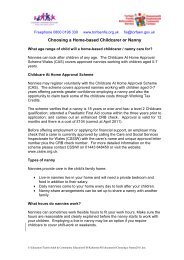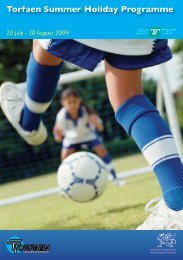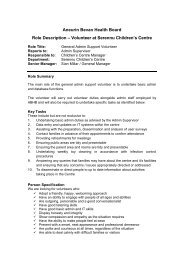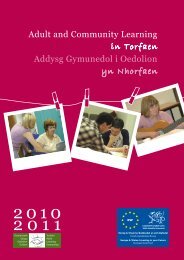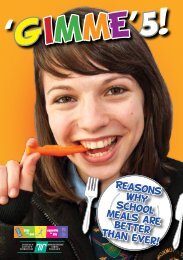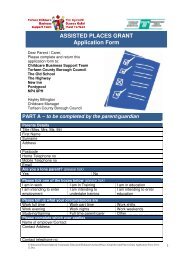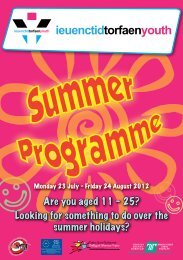Food and Health Guidelines - Torfaen Family Information Service
Food and Health Guidelines - Torfaen Family Information Service
Food and Health Guidelines - Torfaen Family Information Service
Create successful ePaper yourself
Turn your PDF publications into a flip-book with our unique Google optimized e-Paper software.
6. Menu Planning<br />
Pre-school children<br />
• Water should be available to drink at any<br />
time of the day. Water quenches thirst,<br />
does not spoil the appetite <strong>and</strong> does<br />
not harm teeth. (See National Minimum<br />
St<strong>and</strong>ards 11.2 ‘Fresh drinking water is<br />
available to children at all times’)<br />
• The only drinks that should be offered<br />
between meals are milk <strong>and</strong> water. Full fat<br />
milk should be the main milk drink until<br />
at least two years old, but semi-skimmed<br />
milk can be introduced from this age<br />
providing the child is a good eater <strong>and</strong> a<br />
variety of foods are taken. Skimmed milk is<br />
not suitable as the main drink for children<br />
under five years of age. When only one<br />
type of milk is provided in an early years<br />
setting it should be whole milk.<br />
• Fresh fruit juice is an excellent source<br />
of vitamin C <strong>and</strong> it is best given with<br />
breakfast or a main meal as vitamin C<br />
helps iron to be absorbed. Juices are<br />
also acidic <strong>and</strong> can cause dental erosion<br />
<strong>and</strong> therefore should only be given at<br />
mealtimes <strong>and</strong> in a cup.<br />
Birthdays <strong>and</strong> celebrations<br />
Birthdays <strong>and</strong> celebrations are an important<br />
part of Early Years settings. In some,<br />
a tradition of lavish celebrations develops<br />
with cakes, biscuits, fizzy drinks <strong>and</strong> goody<br />
bags full of sweets. This may not be very<br />
healthy for children in large settings where<br />
there are lots of birthday to celebrate. It may<br />
be worth including information on birthdays<br />
to new parents in your healthy eating policy,<br />
see section 8.<br />
It can include:<br />
• How <strong>and</strong> when the cake will be served<br />
<strong>and</strong> who will provide it. Ideally it should<br />
be eaten as part of a meal, alongside<br />
nutritious savoury options.<br />
• What kind of treats, if any, can be brought<br />
in by parents for other children?<br />
Some settings may opt for a pretend cake<br />
with real c<strong>and</strong>les which the children can<br />
blow out.<br />
• Sugary drinks such as lemonade, colas<br />
<strong>and</strong> squashes contain added sugars <strong>and</strong><br />
citric acid <strong>and</strong> are not necessary in a<br />
child’s diet. They should not be offered at<br />
snack times <strong>and</strong> definitely not given in a<br />
bottle. They are a poor source of nutrients<br />
<strong>and</strong> contribute to dental caries/ dental<br />
erosion especially if sipped continuously<br />
from a bottle.<br />
• Low calorie squashes/lemonade contains<br />
citric acid <strong>and</strong> can contribute to enamel<br />
erosion, therefore should be restricted to<br />
meal-times.<br />
• Tea <strong>and</strong> coffee are not advised for under<br />
5’s as they contain caffeine <strong>and</strong> tannins.<br />
Caffeine acts as a stimulant <strong>and</strong> tannins<br />
interfere with the absorption of iron.<br />
14



